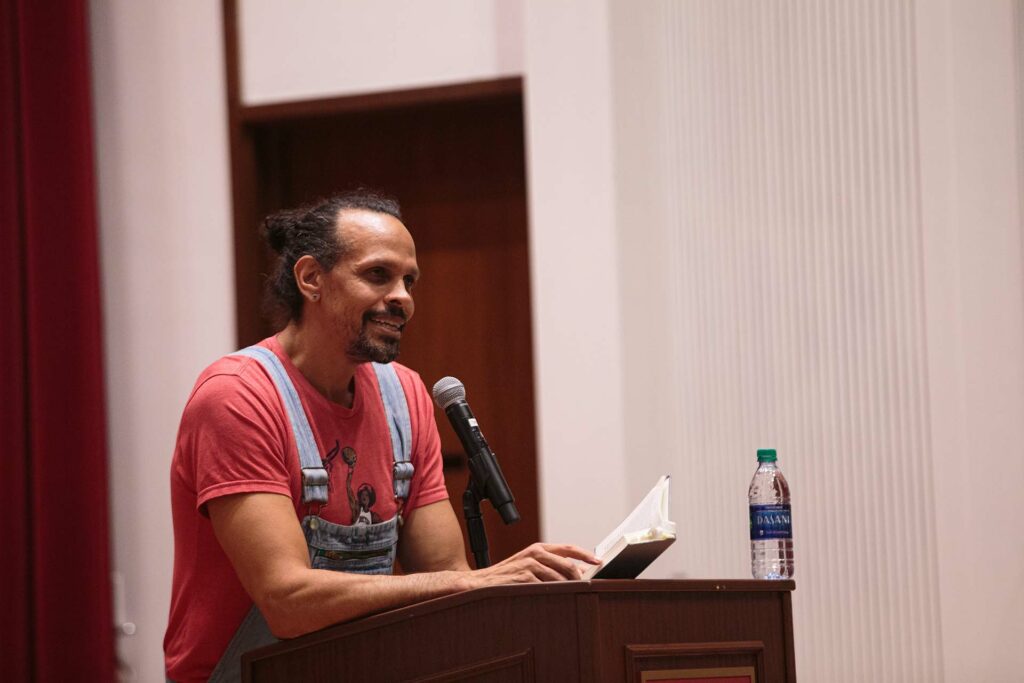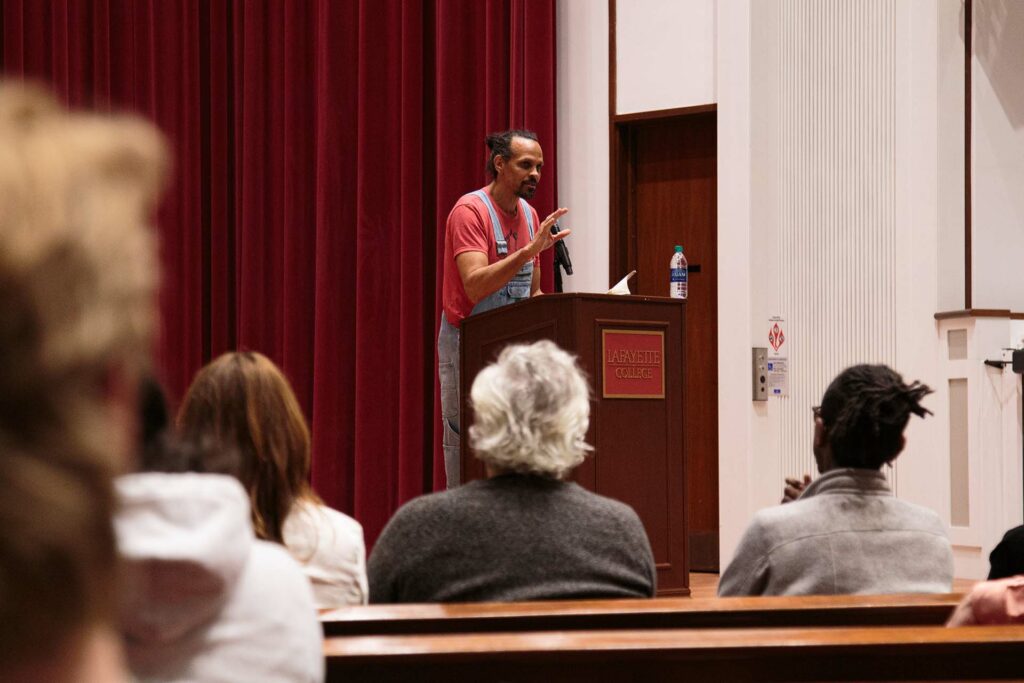By Stephen Wilson
Winner of the 2015 National Book Critics Circle Award and finalist for the National Book Award in Poetry, Ross Gay ’96 spent several days on campus to visit various classes, deliver a keynote address, read from his collections of poetry and essays, and discuss writing and creativity in a few question-and-answer sessions.
 His latest book, The Book of Delights, released in February, traverses a year of looking for joy, however fleeting, captured in essays, some as short as a paragraph. The New York Times Book Review said in its review, “The delights he extols here (music, laughter, generosity, poetry, lots of nature) are bulwarks against casual cruelties. As such they feel purposeful and imperative as well as contagious in their joy.”
His latest book, The Book of Delights, released in February, traverses a year of looking for joy, however fleeting, captured in essays, some as short as a paragraph. The New York Times Book Review said in its review, “The delights he extols here (music, laughter, generosity, poetry, lots of nature) are bulwarks against casual cruelties. As such they feel purposeful and imperative as well as contagious in their joy.”
The Class of 2023 read the book as part of this year’s community reading, so joy has been a regular theme on campus since the start of the year and ascended during his visit.
Here are some of his thoughts on writing and Lafayette as shared with three sections of creative writing courses gathered together to pick his brain.
Why delight?
I was walking on a hill in Italy and thought, “Delight.” I’m an etymology guy, but I didn’t even take the time to look it up. It just sounded right.
Did you search for delights?
The more I looked the more they came. For one year I decided to write a short essay each day about delight. I thought it would be hard and challenging. But two weeks in, I had to decide which ones to write about because there was an abundance of delight. There was no scarcity.
What was your process for writing about delights?
I completed an essay a day. I wrote by hand and had 30 minutes to draft it. It was different than a freewrite because I felt like it could be a book, so I wrote with the intention of having an audience and seeking publication. When I typed up the draft, I edited as I went, but soon stopped editing because I realized I was killing them.
How was it different from writing poetry?
My prose has a different relationship to knowledge. I could think about what delights me and why. But a poem is me listening to something I don’t know how to hear yet. It is an inquiry that I hang around in and get lost in for a while.
Would your mood impact a delight if you were having a bad day?
Delight is not delightful. There is sorrow and brutality. In writing I’d often arrive at something outside that delight. But delight will grow as you focus on it for 30 minutes each day. When walking around looking for what’s delightful, your orientation changes a bit.
 Now that the assignment is done, what did you learn?
Now that the assignment is done, what did you learn?
Assignment. I like that. Delight was not something I spent a lot of time on. It is a sharing mechanism. When we see something beautiful or are moved by witnessing tenderness, we share it. Our lives are made of small tendernesses, but not only that. Delight is a surprise, like I had no idea how light can travel through the earlobes, but I see it and want to share it. There may be a nutrient-deficient tree, and the mycelium network beneath that tree can notify a tree with abundant nutrients and draw from it and share it to make a healthy forest. Delight is an incredibly beautiful moment while knowing we are all going to die. There is hurt, sorrow, and pain in it. That is joy: the fundamental un-alienation of one another, how deeply and all connected we are. Joy also contains our sorrow. The question is how do you hold it together, how do you behave with one another while knowing that and still feel joy?
What did you like most in your time here?
Football. Faculty like Lee Upton and Ed Kerns. I had incredibly generous mentors who looked out for and cared for me. I didn’t have a great time. I was often f*cking off and not doing what was needed. David Johnson was one of the first who saw me struggling and asked me to present on Amiri Baraka. Ahhh, poetry! But when I first got here, I’d see 18-year-olds driving cars that were three times as much as my dad’s car. It enraged me. That and the race stuff. Ed Kerns set up a studio for us in Hogg Hall, this place to create. I was lucky to find other spaces to be in and find friendships in those spaces that I still hold.
Do you find looking inward a challenge?
I write about things that challenge my sense of self. I’m interested in writing things that are not easy, things I don’t want to talk with others about or even with myself.
 His latest book,
His latest book,  Now that the assignment is done, what did you learn?
Now that the assignment is done, what did you learn?